Rethinking Faith: Trad Wives, American Evangelicalism, and Imagination
This month let's explore the trad wife influencer phenomenon, ponder what came before American Evangelicalism, and question how we use our imagination.
Rethinking Faith: May 2024
Welcome to the May issue of Rethinking Faith. This month we will explore the trad wife influencer phenomenon that is exploding on social media, ponder what came before American evangelicalism, and question the ways we use our imagination.
Each section of the letter will be filtered through the lens of Karen Swallow Prior’s recent book The Evangelical Imagination: How Stories, Images, and Metaphors Created a Culture in Crisis. This is the first time an entire newsletter has focused on aspects of a singular book, but this book has consumed all of my thoughts and ponderings and I think it’s vital that we begin having these conversations.
What is a Trad Wife and Why are They a Thing?
If you are on social media, and if you search or like certain things, you may begin to notice a certain flavor of influencer. When I first came across this content, I was pretty sure that I’d gone back in time to my cult days without realizing it. Or that people from my cult days had time traveled to the future and were showing off our lives. I found women with entire platforms dedicated to aesthetically curated feeds of them wearing pretty dresses while doing chores around the house. It was trippy.
Hanging laundry on the line with their perfectly dressed children playing on a quilt in the background. Snipping fresh cut flowers from their garden with a wicker basket on their arm. Baking sourdough bread with a little smudge of flour on their nose. Homeschooling from a picture perfect school room. All of these chores were completed with with peaceful smiles, serene children, and perfectly curled hair. Who were these people? And why?

I didn’t know it then, but I’d just had my first experience with a trad wife.
Trad wife is short for “traditional wife,” and there is a group of women who are romanticizing that image on their social media accounts. I don’t have a problem with people doing old-fashioned, homemaking things. You want to homeschool, bake sourdough bread, garden, can fruit and veggies, sew, and raise chickens? Be my guest. But the minute you tell me that this lifestyle is the godly or biblical way to do things, or if you insinuate that you are better than others because of your choices, I will probably react.
Because I’ve lived this lifestyle. And I know the truth.
Where did this weird fascination with an imaginary “old-fashioned” life (that didn’t really exist) come from? It’s a familiar thing to me. In fact, I used to wish that I’d grown up in the 1800s. I felt like I belonged there more than I did in the 1990s. The only problem is that the clean, peaceful, perfect 1800s that I imagined never actually existed. Anne of Green Gables and Jo March weren’t real people. And the stories their authors told left out much of the dirt, poverty, abuse, societal hierarchy, and hidden brokenness of the actual time period. What is it that draws us to this imaginary, old-fashioned existence?
Most likely we think we are looking for simpler times, but my gut tells me that we are actually longing for Eden.
I started the introduction to The Evangelical Imagination and almost immediately came across this paragraph:
“If you are an evangelical Christian, you will probably begin to notice something over the course of our study together. You will notice a pattern emerging from all this Victorian literature…and by seeing in the literature many of the values and beliefs prominent within American evangelicalism today, you might find yourself wondering whether some of the ideas that characterize today’s evangelical culture are Christian as much as they are Victorian.”
I found myself thinking about the fundamentalist fixation on the 1800s in my cult as well as that of modern evangelical trad wives. Is this the connection that I’d been looking for? I posted my ponderings on Threads, “Coincidence? Probably not.” Karen Swallow Prior responded quickly with two words.
“Definitely not.”
I couldn’t wait to read more.
“Paradoxically, in the midst of an age centered on reason, rationalism, and science—all of which are supposed to demonstrate the unity and universality of truth—a religious movement expressive of individual experience would become dominant. But it is perhaps not paradoxical after all: the bridge between these two seemingly contradictory impulses is “experiment.”
But what experience gives, experience can take away.”
~ Karen Swallow Prior, The Evangelical Imagination
In a time when the word “evangelical” is closely associated with politics, party liens, and a certain set of social beliefs, it can be hard to remember that modern American evangelicalism is merely a sad whisper of an original movement that is over three-hundred-years-old and spans various cultures and continents.
I’m less than a third of the way through The Evangelical Imagination but I’m already appreciating the reminder that evangelicalism didn’t even start in America. With the mess that we are in these days, it is easy to want to jump ship and get as far away from the word evangelical as possible. And yet as I read about the history, discover the roots, and am reminded about the original definitions, I find myself recognizing that, while I may not want to identify as an American Evangelical these days, I am—at my core—still evangelical. And I’m not sad about it.
And yet, look at what a disaster we have created.
“The evangelical movement emerged from a time in church history when many identified as Christians but did not truly believe. Now, three centuries later, many who identify as evangelicals not only don’t embrace evangelical beliefs, but they don’t even know what defines evangelicalism. “Evangelical” as an idea has devolved into polling, political, and marketing categories.” Karen Swallow Prior, The Evangelical Imagination
This is not a light read. It takes time and effort. Karen Swallow Prior is a professor, lover of literature, and user of large words. The book feels academic much of the time. But I am learning SO much. I need this book to fully grasp, not only where we are at in this snapshot of history and how we got here, but also where we came from and where we might end up again.
It’s easy to go through broken church experiences full of spiritual abuse and religious trauma and want to write off the church. It’s easy to see what American evangelicalism has become as a consumeristic, marketing conglomerate, and want to reject it all.
And yet, as I look at the history of the evangelical movement, as I ponder the stories of people who had unexpected experiences with Jesus and realized that His death on the cross was for the forgiveness of their sins with the goal of reconciling them personally to Himself, I realize that these values are the same things I passionately communicate every week. And I find myself hoping that in this time of darkness and confusion, perhaps the Holy Spirit will move and humanity will awaken yet again.
Using my Imagination
“Imagination engages our whole humanity: physical, emotional, intellectual, and spiritual. This truth is the starting point of any right understanding of the imagination, including its role, power, and significance.” Karen Swallow Prior, The Evangelical Imagination
I was a child with a vivid imagination. I’m pretty sure I didn’t actually take a submarine ride to the bottom of the ocean with my siblings and favorite cousin, but it still feels incredibly real even after all these years. Books came alive in my mind. Stories swirled in my head every night before I went to sleep.
These days I know that my imagination is part of what makes me empathetic. I could never work at a funeral home because I would be a sobbing mess just imagining what each family was going through.
Things don’t have to be true to be powerful thanks to our imagination. Many movies and fictional books have had profound impacts on me. And yet, when we choose to use our imagination to create or to maintain a false reality, we become delusional.

My imaginary, romanticized Civil War fantasies came to an abrupt halt when, at age eighteen, I actually visited Civil War battlefields and museums. Reality has usually much dirtier and harsher than our imagined dream worlds.
In light of what I’ve read so far in The Evangelical Imagination, I have some goals:
I want to fully engage all parts of my being through healthy imagination.
I want to take time to think about why I imagine or perceive certain things to be true (or why I want them to be true).
I want to try to see from other people’s perspectives and realities.
I want to become even more empathetic as I attempt to understand.
I want to use my imagination for good, not to create a false reality where I can feel safe.
How about you? Have you ever taken the time to consider how we use our imagination? Or why we gravitate to certain possible realities—like conspiracy theories or trad wives? I think these are some important things to ponder.
As always, I'd love to hear your thoughts, questions, or comments. You can find me on Threads, Instagram, Facebook, my website, and on my podcast Looking for the Real God. I’d love to connect with you on any of these places!
My podcast, Religious Rebels, can be found on YouTube, Apple Podcasts, Spotify, iHeart Radio, and more. New episodes drop every other Sunday at noon on YouTube and 5pm on Substack and everywhere you listen to podcasts.
You can also order an autographed copy of my book, Religious Rebels: Finding Jesus in the Awkward Middle Way by clicking on the button below. Or you can find it on Amazon.

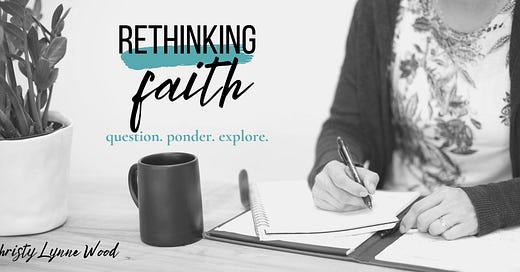



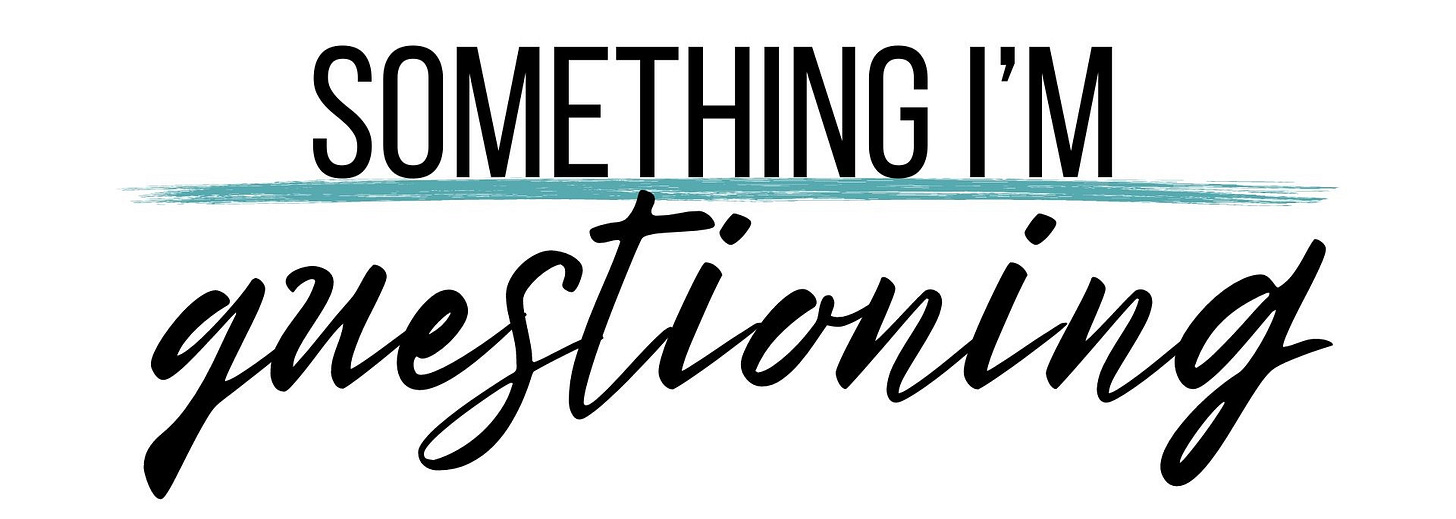
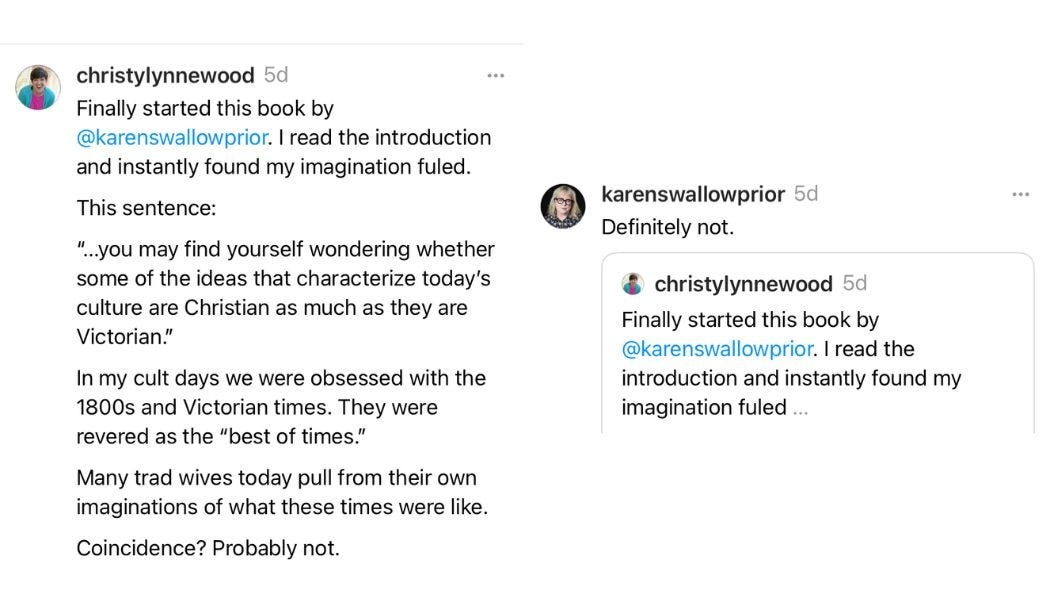
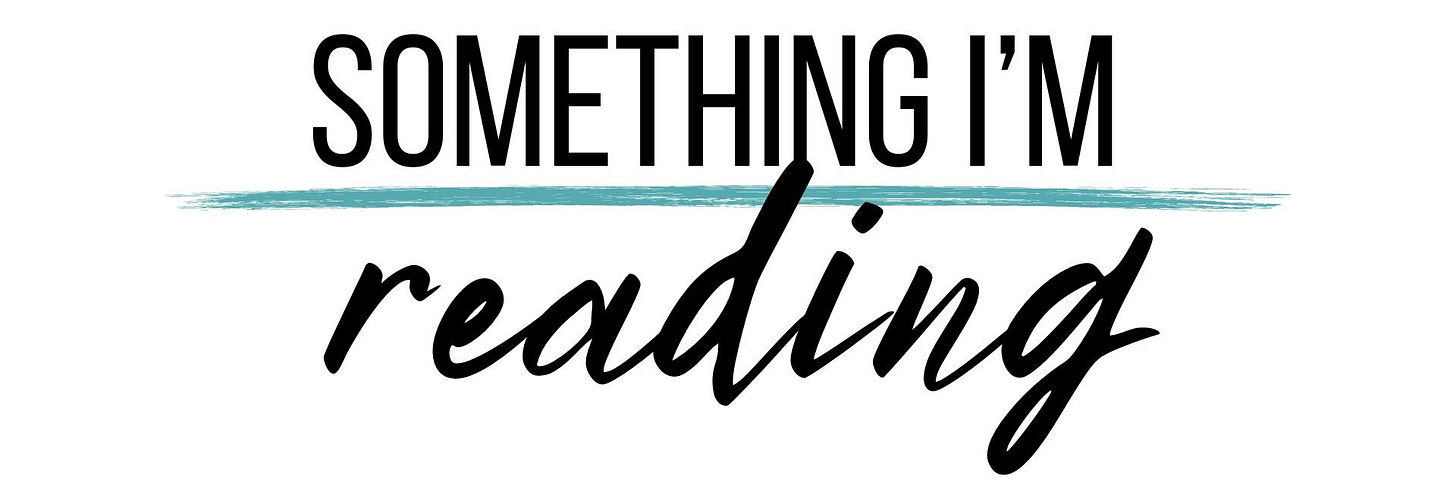
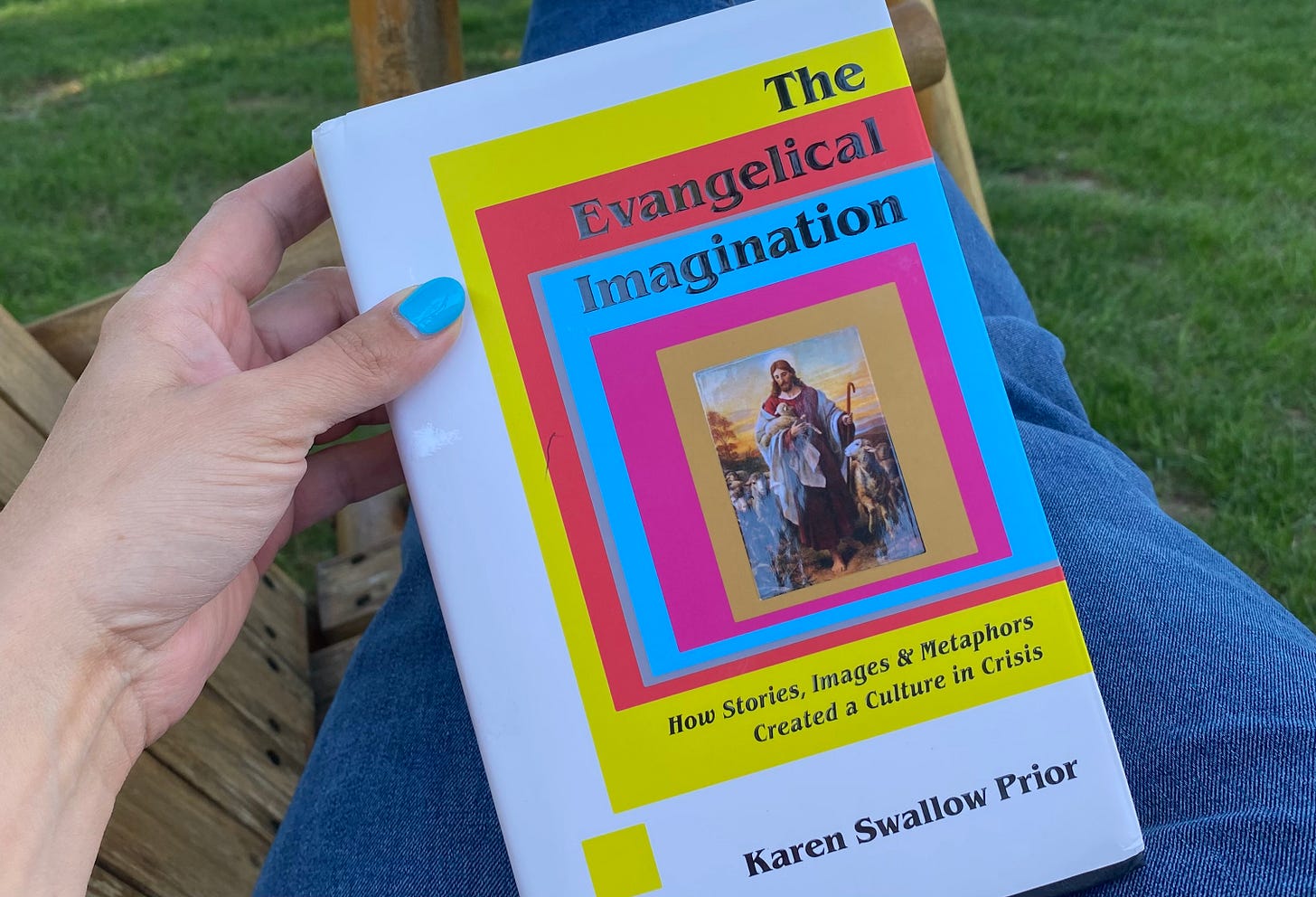
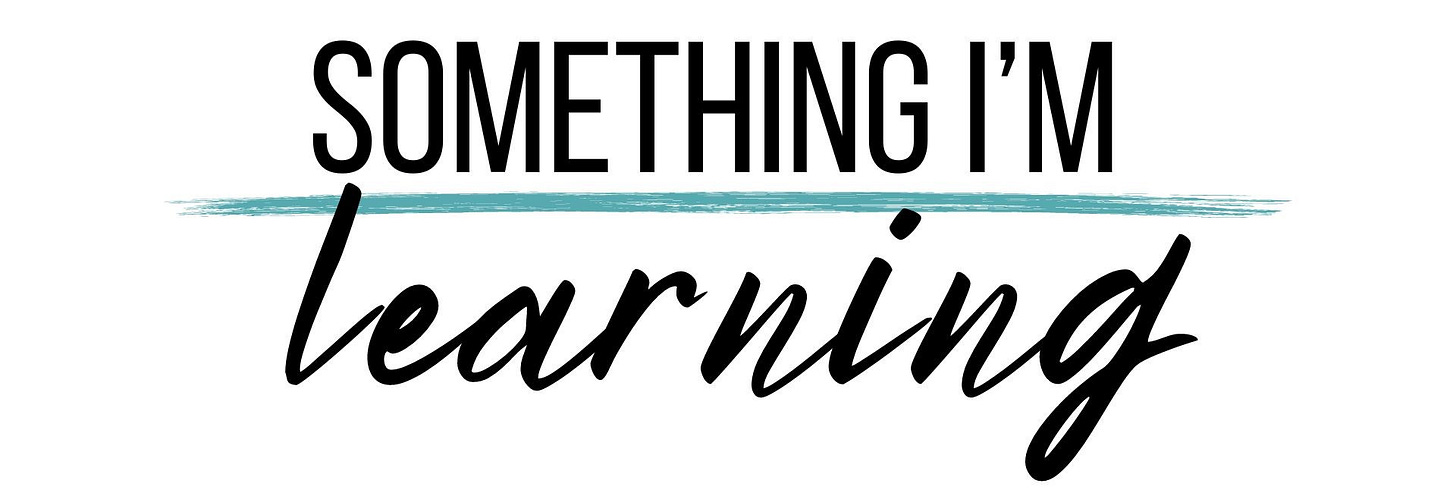
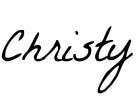
"Most likely we think we are looking for simpler times, but my gut tells me that we are actually longing for Eden."
You've hit the nail on the head. Unfortunately many so-called christians believe that the world began in the 1950s. What many don't realize is that nothing is new under the sun and every generation has lived in the cycle of brokenness. And this vision of the trad-wife is nothing but TV-generated fantasy.
My mother lived the rural traditional life decades before social media. She used to sew little pioneer-type outfits (late 70s style!) for her children. Her 'traditional' activities such as sewing, canning, baking, gardening, and keeping goats and chickens for eggs and milk were to help supplement a low income. Apparently, when we were very small, acquaintances from the city would come out to visit to see our 'traditional' lifestyle and gush over how cute it was. Audience nostalgia over that non-existent past is no doubt a driving factor for the current social media trend.